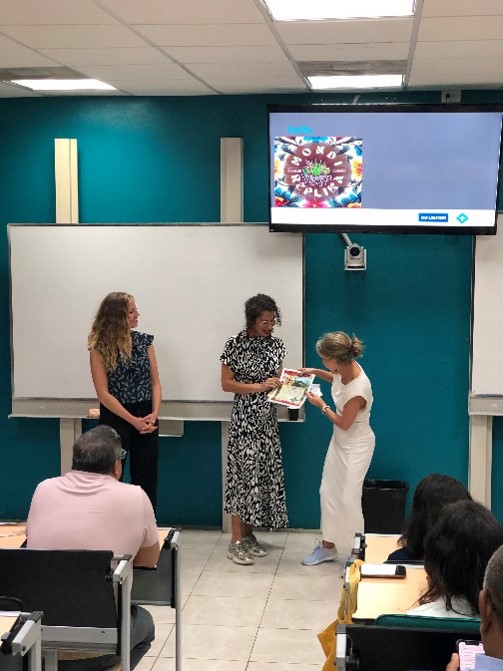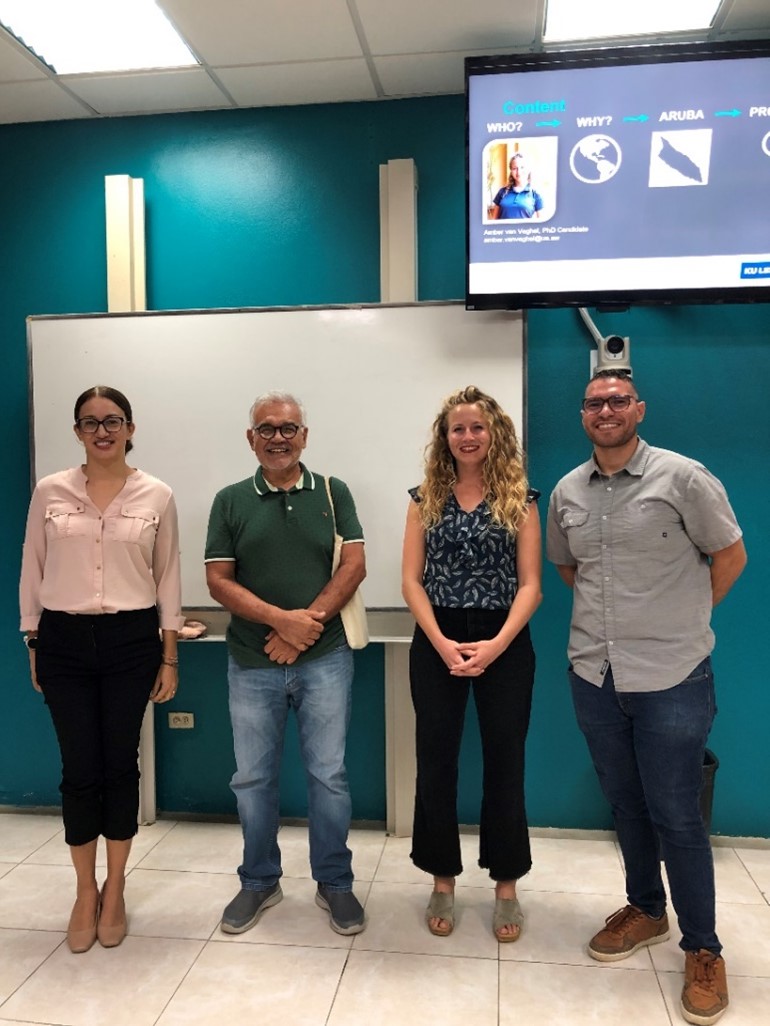
The Environmental Impact of Aruba’s Food Consumption, using Life Cycle Assessment (LCA)
THE ENVIRONMENTAL IMPACT OF ARUBA’S FOOD CONSUMPTION, USING LIFE CYCLE ASSESSMENT (LCA)
The global food system isn’t doing so well and Aruba is very much dependent on this system. This was the message presented by Ms. Amber van Veghel during an activity of the KIVI Kring Caribbean – Aruba at the University of Aruba on the 11th of April 2024. Using Life Cycle Assessment or LCA, according to the ISO 14040 standard, Amber, a PhD candidate at the Catholic University of Leuven (Belgium) in close cooperation with the University of Aruba, is investigating the environmental impact of Aruba’s food consumption. A fun example showed by Amber is the difference in carbon footprint of a very famous Aruban snack called “pastechi”, which is daily consumed by a lot of inhabitants on our island. This pastry is filled with different ingredients like beef, chicken, fish, cheese or vegetables. It’s concluded that the beef containing “pastechi” has the largest carbon footprint compared to the other options. A lentil-based pastechi would have the lowest carbon footprint (see the corresponding slide).
After telling the audience why we should be concerned about the environmental impact of our food, Amber showed the question raised by 37 scientists within the framework of the Eat Lancet Commission (EAT - The science-based global platform for food system transformation (eatforum.org) in 2019: “Can we feed a future population of 10 billion people a healthy diet within planetary boundaries?” And the answer is YES but we cannot do this without a dietary shift towards more plant-based diets. And, we should also focus on reducing food waste and improving agricultural production methods.
Since Amber is still involved with her PhD research work, a lot of her data about Aruba cannot be disclosed at this time. Her promotion is expected to be at the end of the academic year 2024 -2025. Some of her slides do contain some information on the environmental impact of Curaçao’s food imports which may be comparable to the environmental impact of Aruba’s food imports.
Before starting the presentation the participants had to complete a questionnaire on their diet, i.e. average, flexitarian (with or without high milk consumption or red meat consumption), pescatarian, vegetarian or vegan. During the presentation, Amber calculated how well the audience was doing with the carbon footprint of their diet. Unfortunately, the carbon footprint our diets was above the limit. To lower our carbon footprint, Amber invited the audience to consume a bit less red meat and bit more vegan meals, while of course still enjoying the experience of eating. To help people with that, Amber organized a raffle among the participants. The winner won a voucher to dine at a Holistic Local Plant based restaurant in Aruba called “Mondi Replika”. The owner of this restaurant was also present and informed the participants on the objective of her holistic concept and invited all to come to proof the food. After all the proof of the pudding is in the eating. Information on vegan restaurants in Aruba can be found on the website Vegan Aruba: The best resource for vegan tourists and locals on the island
Another nice initiative by Amber was to have this presentation filmed. The video impression can be found on Instagram: Amber S. van Veghel (@ambervanveghel.phdcandidate) • Instagram-foto's en -video's
And this presentation can be found here.





KIVI KRING CARRIBBEAN – ARUBA invites you to attend its presentation with the following title:
“The Environmental Impact of Aruba’s Food Consumption, using Life Cycle Assessment (LCA)”
by Ms. Amber van Veghel
KIVI Kring Caribbean – Aruba invites you to an enlightening event featuring a distinguished PhD candidate from the Catholic University of Leuven (KU Leuven Belgium) participating in the SISSTEM program at the University of Aruba. Join us for an insightful and interactive presentation on “The Environmental Impact of Aruba’s Food Consumption, using Life Cycle Assessment (LCA)” which is a pivotal aspect of Amber’s groundbreaking research on food and sustainability.
This event provides a unique opportunity to understand the environmental implications of our food choices in Aruba. Ms. Amber van Veghel’s expertise and dedication to sustainability make this a must-attend for anyone passionate about the future of our island.
Under 'Documenten' you can find a short paper on the carbon footprint of Aruba’s vegetable imports, which will also be discussed during the presentation.
Who is Amber van Veghel?

Amber van Veghel’s PhD research is performed within the SISSTEM program at the University of Aruba. SISSTEM focuses on Sustainable Island Solutions through Science, Technology, Engineering and Mathematics, and is a collaboration between KU Leuven and the University of Aruba. Amber was born in Curacao and moved to Aruba in 2020. She is committed to making it easier for people and for organizations (in the Caribbean) to make more sustainable choices, especially in the field of food.
Amber’s statement is “Food is simply the tastiest way to mitigate climate change and other environmental issues”.
Amber obtained an MSc degree in Food Technology at Wageningen University & Research in 2017, after her BSc graduation at the same university in 2014. Since 2017 she has been active in the field of food and sustainability, which shaped her holistic view on sustainable and healthy food systems.
KIVI KRING Caribbean - Aruba invites all engineers and others interested to attend this presentation to get more insight in the most recent research on the CO2 footprint of food consumed on Aruba. This activity will take place at the University of Aruba in room A at Juancho Irausquin Plein 4, Oranjestad on Thursday April 11, 2024 at 7 to 8 p.m. followed by KIVI’s networking session from 8 – 9:00 p.m. while enjoying a drink and a snack. An entrance fee of 15 AWG florins is charged to KIVI members to cover the costs while non-members are charged 20 AWG fls. There is a free entrance for students at the University of Aruba while the entrance fee for the PhD candidates is 5 AWG fls. You can register via the KIVI website.
